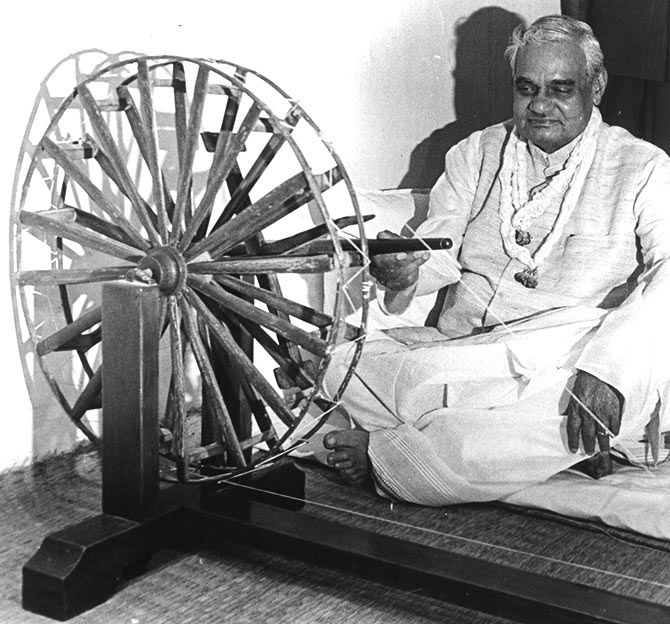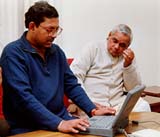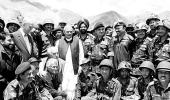'The sorry image of a wailing leader visiting relief camps for riot victims was completely incoherent with what he did next, blaming the minority community for the disturbance.'
Utkarsh Mishra pens a tribute from the heart.

When revolutionary Jatin Das died in jail while playing an active role in the famous hunger strike by Bhagat Singh and comrades, Mahatma Gandhi wrote nothing in his newspaper Young India.
Subhas Chandra Bose writes in his book Indian Struggle that when he was asked by a follower why he did not write anything on Jatin Das's martyrdom, Gandhi replied that he purposefully avoided commenting on it because if he did, he 'would have been forced to write something unfavourable'.
I was in a similar dilemma while trying to write something about a leader who was so loved by the country he served and led.
I've been reading all kinds of obituaries since the evening of August 16; most of them admiring the persona, which can certainly be done in this case without indulging in clichés and hyperbole. But there were also a few, which included some critical element needed to make it more honest.
Not that I believe in de mortuis nihil nisi bonum (of the dead, nothing but good), and not that I do not hold critical views about the man, but somehow I did not want them invoked for the time being.
But it would be unfair to call oneself a journalist if one doesn't contribute a few lines to the conclusion of one of the most important chapters of Indian political history.
So, I thought the least I could write without being dishonest is how my understanding of one of India's greatest leaders was shaped over the years.
The generation to which I belong began to gain political understanding only during the P V Narasimha Rao years. I remember the summer evening when I heard the term 'prime minister' for the first time when my father told us that Rajiv Gandhi has been killed.
That day inculcated a life-long fear of firecrackers in the mind of my younger sister, and every Diwali she would remind us boys not to burst loud crackers, also called bombs, as Rajiv Gandhi was killed by one.
Our next few years passed in trying to remember, and sometimes making fun of, the full names of P V Narasimha Rao and H D Deve Gowda. (Yes, we North Indians do that with South Indian names. We not only 'sing' the names, we often corrupt them to the nearest Hindi equivalent.)
The first, 13-day, stint of new Prime Minister Atal Bihari Vajpayee was followed by the Deve Gowda and I K Gujral era, which also came and went quickly. And it was only much later that some of us realised the folly of a man called Sitaram Kesri in destabilising a gentleman's government for silly reasons.
And that sequence of events once again brought Vajpayee to power, this time for 13 months. I distinctly remember the day when, glued to our TV screens, we learnt that Vajpayee had lost the vote of confidence by a single vote.
The dramatic event had convinced the adults around me, all except my father, that they have to bring 'Atalji' back to power with a robust majority this time.
This resolve was strengthened by the way in which Vajpayee was appealing to everyone to vote for him. It was not in 2014 that the Bharatiya Janata Party's campaign went 'hi-tech', it had happened earlier.
In 1998, one used to get phone calls from the BJP and a taped message in Vajpayee's voice played on, lending a personalised touch to the campaign.
I remember how every household was getting a telephone call 'from the prime minister'. In our family, I was the 'fortunate' one to pick up that call.
'Namaskar, main Atal Bihari Vajpayee bol raha hoon,' I heard, and, in extreme joy, woke up my mother who was taking a precious afternoon nap, and missed the next few lines in the process.
Nevertheless, the voice continued, 'inke ek vote ne meri sarkar ko gira diya hai; aapka ek vote meri sarkar bana sakta hai.'
If I had voting rights then, I would have certainly given him that one vote, which many gave so that a 'videshi' (a reference to then Congress president Sonia Gandhi) doesn't become India's PM.'
We youngsters were mesmerised by tales of Atalji's glory told to us by elder brothers or uncles (another trait of north Indian homes, where women seldom like talking politics); of the Golden Quadrilateral and telecom revolution etc.
But something of significance happened with me a few years later. I was asked to play the role of 'Leader of Opposition' in an inter-school 'youth parliament' competition. I had to bring in the no-confidence motion on the 'floor of the House'.
My subsequent 'research' introduced me to details of the Kargil coffin scam, the 'mishandling' of the IC-814 hijack, the 'UTI US-64 scam' etc.
And playing the LoP, I actually started criticising the government.
And then 2002 happened.
We felt pity for the leader against who a newly elected chief minister of his own party led a virtual coup d'etat, apparently with the blessings of the party's second senior-most leader.
But the sorry image of a wailing leader visiting relief camps for riot victims was completely incoherent with what he did next, blaming the minority community for the disturbance.
Why did he do that? Because he saw more radical elements drawing bigger support, sidelining him while he was still at the helm? Maybe.
Nevertheless, his enthusiastic lines saying 'Geet Naya Gaata Hoon' were changed to Geet Nahin Gaata Hoon, not mincing any words about how betrayed he felt.
As we entered the age of YouTube, we had his December 5, 1992 speech in Ayodhya one click away. That introduced me to a different Vajpayee I hadn't known till then. I also came to know about a similar speech he gave during the 1983 Assam election -- a few days before the Nellie massacre -- which even the BJP disowned.
Though I was disillusioned, I could see the change the man had gone through from calling for 'levelling the ground' in Ayodhya to weeping at a relief camp in Gujarat.
These are the few critical points the 'more honest' obituaries raise. There are others, a few personal ones. But if Vajpayee teaches us one thing, it is how not to become personal in political criticism.
Those who hve watched the Jeff Bridges starrer The Contender (2000) will understand why it shouldn't be done.
Once, during a discussion on Vajpayee, a very dear friend told me that if you set the bar that high for a politician that one should get no chance to criticise, then you'll be left with no politicians worthy of admiration.
It is the very nature of politics that it doesn't leave one untainted. It is for the observer to decide how it weighs upon the overall personality of a leader.
Vajpayee, in many ways, was a unique personality. A full-time RSS pracharak who admired Nehru almost like a fanboy.
As his biographer Ullekh N P writes, 'Despite his 'secular' statements in Parliament that bordered on the Nehruvian, Vajpayee has often taken brief excursions into the hard-line camp'.
That notwithstanding, in Vajpayee's case, as they say in law, the 'mitigating factors' outweigh the 'aggravating' ones.









